Illicit drugs are simply those substances that are illegal to have, or possess, but have no medical applications and can be dangerous or even deadly to consume. In simpler terms, illicit drugs are mostly unregulated drugs like cocaine or heroin. However, this definition also includes prescribed medications that are obtained without a doctor’s prescription. It also includes compromised medications that have been altered. Illicit drug abuse can cost you more than just your money. And with our hectic, modern lifestyles, it is easy to understand how illicit drugs have become such a problem. Many people turn to illegal drugs and other substances to find relief. However, illicit drugs are highly addictive.
For this reason, many of these substances are linked to ongoing social problems as they plague communities. This includes issues like increased rates of unemployment, mental health concerns, family trouble, homelessness, and health problems.
We are here to help you find a better way.
Common Illicit Drugs
Some of the most common illicit drugs include:
- Marijuana/cannabinoids
- Opioids, including misused prescriptions and heroin
- Stimulants, particularly cocaine, methamphetamine, and MDMA/ecstasy
- Ketamine – a short-acting anesthetic with hallucinogenic effects
- Inhalants
- Hallucinogens, LSD is the most common
One of the biggest reasons illicit drugs are abused is the desire to find relief from certain difficulties or dysfunctions. Whether the goal is relief from mental health symptoms, pain, or stress, the end result is often not what you were hoping for.
It would be difficult to produce a full list of illicit drugs because there are so many different possible combinations and substances. But some are more common than others.
What Makes Illicit Drugs So Dangerous?
- They are unregulated, so you’ll never know the true level of potency
- Illicit drugs are often cut with other substances, you don’t know how your body will respond
- Many are highly addictive
- Purchasing these substances puts you at risk with dangerous individuals
- If you are injecting these drugs by sharing needles you risk HIV or other diseases
- You can run into trouble with law enforcement since these are illegal to obtain
Every time an individual decides to purchase an illicit drug they are essentially putting themselves at risk for serious consequences. From the moment you purchase the substance to the time you use it’s an ongoing chain of events that can bring about many ramifications.
While the risk of addiction is the most common outcome, there is also the risk of incarceration, becoming a victim of assault, or even overdose leading to death. Choosing to continue illicit drug use puts you at greater risk for each of these consequences each time.
History of Illicit Drugs

Surprisingly, many of the most common and dangerous illicit drugs we know today were first used in medical settings. Drugs like cocaine were given to treat pain. Heroin was used to treat patients with asthma. Opium and alcohol-based medicines were thought to ease anxiety and calm the nerves. Teething infants were given syrups that contained small amounts of morphine. Morphine has the earliest origin. It was the first addictive ingredient isolated from a natural product, dating back to 1806. When they were first discovered, many illicit drugs were praised as miracle treatments.
But as time went on, medical professionals were able to study and understand the long-term effects these drugs had. Once it was discovered how harmful they truly were, many of them were labeled illegal and dangerous. This labeling began in 1973 when the Drug Enforcement Administration or DEA was created to help combat drug production.
Unfortunately, these labels are not always effective enough to prevent illicit drug abuse. Throughout the 60s, marijuana, LSD, and cocaine saw widespread use. Cocaine addictions plagued the decades of the 80s and 90s. And today, we are facing an opioid epidemic that started with skyrocketing prescriptions.
Side Effects of Abusing Illicit Drugs
- Developing a mental health disorder like anxiety or depression
- Flu-like symptoms like body aches
- Vomiting or nausea
- Shakiness or tremors
- Delusional thinking
- Weakened immune system
- Seizure, stroke, or general brain damage
- Attention and memory problems
- Strain on the liver or even liver failure
- Weight gain or loss
- Lung disease
If you have found yourself abusing or addicted to illicit drugs, you may already be experiencing some of the most common mental and physical side effects. Illegal drugs are often more dangerous than even misused prescriptions for several reasons.
For starters, illicit drugs are often mixed with other substances without the user’s knowledge. This practice, performed by drug dealers to keep their profits high, increases the drug user’s chance of overdose and other negative outcomes. Overdose is one of the most troubling side effects of illicit drug abuse.
But there are plenty of others to take into account, as well. Depending on factors like the type of drug, frequency of use, and method of ingestion, drug abuse side effects can range from mild to fatal.
Many of these substances can alter your thinking and judgment, lead to persistent health risks, infectious diseases, and accidents. Negative health effects from substance abuse can occur after just one use. Let us help you build a better life free from illicit drug abuse.
Illicit Drugs and Mental Health
Your illegal drug abuse may bring about a mental health disorder. Your substance abuse may also begin because you feel compelled to use illicit drugs to cope with the symptoms of your mental health disorder.
Your ability to control your moods, stress levels, memory, or decision-making skills can all be impacted. Certain illicit drugs can also affect your sleep patterns, judgment, relationships, and propensity toward violence. Illicit drugs are often linked to mental health disorders like anxiety, depression, bipolar disorder, and several others.
Addiction itself is a chronic brain disorder and it changes how certain brain circuits operate. These brain impairments can interfere with how you perform even the most simple of tasks.
Our dual diagnosis program offers highly specialized care for patients with both mental health disorders and addictions. Help is available for illicit drug use and mental health disorder, you simply have to accept it.
Treatment Options for Drug Addiction
Conveniently located in Northern New Jersey, we are available to help anyone who is looking for the perfect place to focus, rebuild, and recovery. Since we are so close to Manhattan, many of our patients choose our facilities to escape from the noise, lights, and distractions of the city.
Our facilities was designed with your comfort and success in mind. Our unique amenities, beautiful facilities, incredible privacy, and supportive team create an effective and comfortable recovery environment.
We can help you through one or more of the following program offerings:
- Drug and alcohol detox
- Inpatient treatment programs
- Intensive outpatient programs
- Outpatient treatment programs
- Partial care programs
- Dual diagnosis programs
Choosing the Right Program for Illicit Drug Abuse

With so many incredible, effective, and flexible treatment options to choose from, it can be daunting trying to narrow it down. But do not worry, we do not expect you to figure it out on your own. Depending on many individual factors like your drug of choice, addiction level, mental health, and schedule preferences, we will work with you to choose the program that will best fit your needs.
Our programs are not one-size-fits-all. They are unique, customizable, and built specifically for the person entering them. Each program makes use of proven therapeutic techniques, holistic remedies, and support groups for a well-rounded recovery. We take a three-fold approach to sobriety by addressing your mental, physical, and spiritual needs and concerns. We will work through the other details to ensure that you are getting exactly what you need from this experience.
Paying for Drug Addiction Treatments
When you are deciding to seek comprehensive addiction care, costs should not be the only factor you consider. You may feel reluctant to seek care if you think it will be too costly. But addiction health care may be more affordable than you think. If you have health insurance, your treatments may be partially or fully covered. Most major health insurance providers offer coverage for these types of treatments to varying degrees.
If you are not sure what is covered by your health insurance plan, please call our admissions specialist. They will review and confirm your coverage. With this step out of the way, you can confidently move forward with a plan in place. If you do not have insurance, ask our admissions specialist about alternative payment options. Do not let costs stand between you and your recovery. You deserve high-level, customized, effective care, and support.
North Jersey Recovery Center
At North Jersey Recovery Center, we want to see you succeed. We strive to provide superior addiction treatment services so that you can get back to your life faster. Our team of professionals will develop an individualized program to address your specific needs. We offer several different addiction treatment options.
Call us today for more information. Our representatives are standing by to answer your questions and guide you through the next steps.








